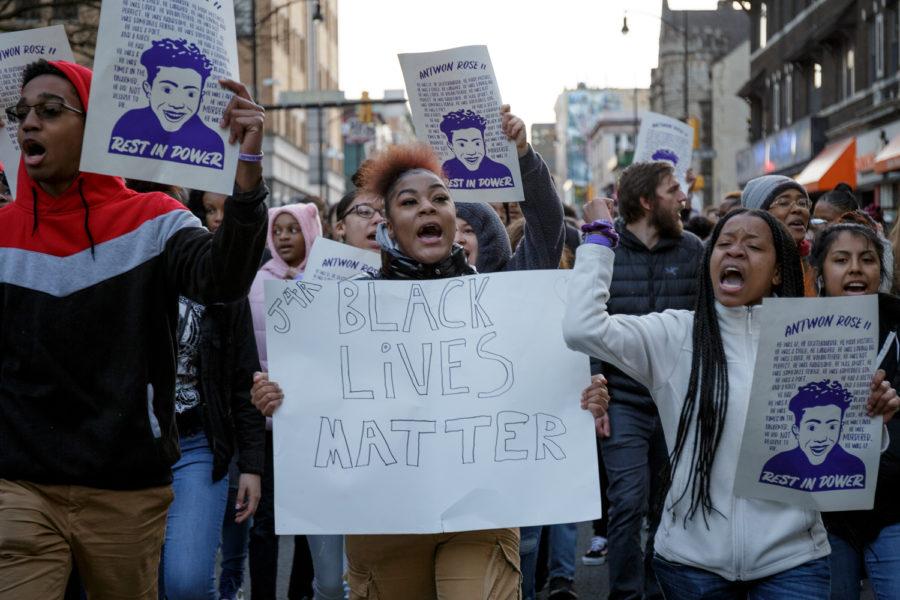Community leaders discuss race, justice at panel
Demonstrators march down Forbes Avenue in wake of former East Pittsburgh police officer Michael Rosfeld’s acquittal in connection to the death of Antwon Rose in March.
June 19, 2019
Pittsburgh has been the center of a considerable amount of discussion about race and justice since an East Pittsburgh police officer shot and killed black teen Antwon Rose on this day last year.
Pittsburgh politicians, artists and officials came together to further these discussions at a Friday panel hosted by The Atlantic at the Ace Hotel in East Liberty. The panel discussed several issues including the fairness of the criminal justice system, policing in Pittsburgh and how race affects these topics, while also speaking about what can be done at both the community and individual level.
Panelists included 1Hood Media founder Jasiri X; Brandon Flood, secretary for the Pennsylvania Board of Pardons; Rep. Summer Lee, D-34; former district attorney candidate Turahn Jenkins and Pittsburgh Bureau of Police Chief Scott Schubert.
Jasiri X, a Pittsburgh-based rapper and founder of 1Hood Media, talked about using art and media to communicate the experiences of African American men and the prison system. 1Hood Media is a website featuring African American artists and their work revolving around social justice.
X has written widely-played songs about the deaths of Oscar Grant, Trayvon Martin and other black men killed in police shootings. He said his work puts him in a position to be both an artist and an activist.
“It was really me doing art out of the passion that I had, which was servicing my community, helping the next generation of folks develop and grow,” X said. “It came organically out of the activism I do.”
Aside from just using media, X believes people of all ethnicities, as well as those in office, should participate in community conversations about these issues, and show up for families like Rose’s.
Lee said policy ideas originate from many different parts of people’s lives.
“Politics starts on the street,” Lee said. “Politics starts in your home. It starts wherever the conflict is.”
Similarly, Flood said he thinks much change can be accomplished at the local level, while also influencing legislators at higher levels of government.
“The ordinances and policies that are crafted on a local level usually force the hand of state legislators, as well as Congress,” Flood said.
Jenkins, who lost a primary battle to unseat Allegheny County District Attorney Stephen Zappala, also shares this view. After previously working as a public defender, Jenkins said he noticed there are people in government positions who don’t fully understand the consequences of their decisions.
“We need to be mindful of the people we put in these positions because they affect all of us,” Jenkins said. “[The system]’s too concerned about convictions and not treating people like people.”
Jenkins said that these officials do not worry about giving convicted people, and their families, the tools to help put their lives back together. Lee echoed these remarks, noting it costs more to fund a prisoner than it does to fund a college student.
“Are we prioritizing building up citizens who are well-rounded, well-educated, who have the resources, the tools to not even come in contact with the criminal justice system in the first place?” Lee said. “Or are we preparing for a state that’s bloated, with folks who we need to house?”
Lee said she is working with other legislators to make the County justice system more fair and efficient. Lee’s colleague, Rep. Jake Wheatley, D-19, is working on a bill that would create a licensing process and form an oversight commission for setting state police standards. Currently, Allegheny County’s many small municipalities have different training standards and resources for police.
“There is no professional board for policing right now,” Lee said.
But those in City and County government say they are already trying to improve their abilities on their own.
Pittsburgh Bureau of Police chief Scott Schubert spoke at the event about a Bureau unit whose sole job is to review national best practices and review incident responses.
“I think we have pretty good policies, but policies change based on incidents that occur to include things that happen to us over the years,” Schubert said. “We put a lot of emphasis on training now.”
Schubert said the Bureau places an emphasis on training its officers and ensuring they understand the community before they walk the streets on their own.
“We have invested a lot with engagement in the community, we’ve opened it up, we want to hear,” Schubert said. “We may not always agree, but you need that input from the community … We are all in this together. Everyone wants a safe community.”








